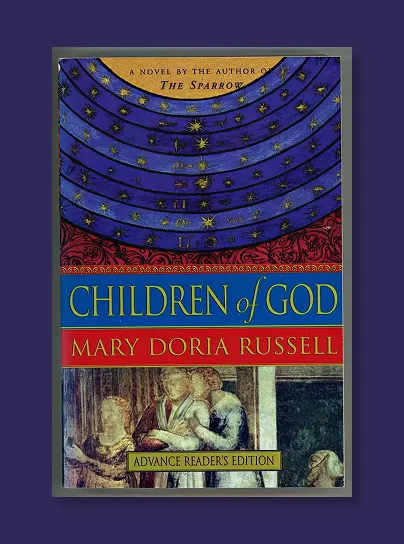
Children of God
Book 2 in the Sparrow series
BEAUTIFUL. This is part two of a profound tale that allows to us examine our relationship to god, the power of belief, love, large-scale power dynamics, and whether or not music is proof of The Divine. The subject matter is complex and nuanced.
He thought of all the ways of coping with undeserved pain. Offer it up. Remember Jesus on the cross. The bromides: God never gives us a burden we cannot bear. Everything happens for a reason.
John Candotti knew for a fact that the old sayings worked for some people. But as a parish priest, he had often observed that trust in God could impose an additional burden on good people slammed to their knees by some senseless tragedy.
An atheist might be no less staggered by such an event, but nonbelievers often experienced a kind of calm acceptance: shit happens, and this particular shit had happened to them. It could be more difficult for a person of faith to get to his feet precisely because he had to reconcile God’s love and care with the stupid, brutal fact that something irreversibly terrible had happened.
The first book sees a diverse but tight group of friends (which includes some Jesuits) journey to a planet near to us because they discover music being beamed from it to space. With the financial assistance of the Jesuit’s Society of Jesus, they go to find the Singers. So as not to includes spoilers here, let’s just say the experience doesn’t go as it was planned.
In the second book, forty-something years later, the Jesuits decide to go again because they really want to believe they’ve found more of "god’s children" in the universe, or perhaps because can’t let go of how rich they could potentially become from what they could bring back. The reader gets to decide that.
"I read somewhere an interesting suggestion. The nations of the world that most vigorously foul the planetary nest and those in possession of the most destructive arsenals ought to be governed only by young women with small kids. More than anyone else, such mothers must live in the future, and they also face each day the realities of raw human nature. This gives them a special insight."
Overall, the writing is sublime. There are long passages of beautiful, thought-provoking prose, yet when we are introduced to the new crew who will be journeying to Rahkat, I had to LOL because the naming of the characters is a bit too on the nose.
Like with the first journey, the crew includes people from various cultures who are appropriately named so we can hear their accents in our head. The first crew included Puerto Rican Emilio Sandoz, Sephardic Jew Sophia Mendez, American cowboy D. W. Yarborough, Frenchman Marc Robichaux, and a few others.
The crew in this second book includes a Basque ecologist named Joseba Urizarbarrena, an Irish guy called Sean Fein (!!), an Italian bodyguard named Niccolo d’Angeli, Fat Frans from the Netherlands, and Danny Iron Horse, the Native American captain.
The Basque moved in the darkness across the commons and took a seat a little distance from Sandoz, the molded polymer chair creaking under his substantial weight.
"When you see a system disturbed, it is a great joy to discover a single cause – the cure then seems simple. As an undergraduate, I would look at satellite images of the planet at night, and the connected concentrations of city lights looked to me like streptococcus taking over a petri dish. I became convinced that Homo sapiens was a disease that was ravaging its hostess, Gaia. The Earth would be well rid of us, I thought. I was nineteen, and the population had already gone from seven to fourteen billion in my lifetime. I began to hate this species that called itself wise. I wanted to cure Gaia of the sickness our species inflicted on her. I began to consider seriously how I might exterminate very large numbers of humans, preferably without being caught. I believed myself heroic and selfless – a solitary worker for the planetary good."
When the second crew arrives to the planet they discover that one member of the first mission has dramatically shifted the power dynamics on the planet by saying out loud to the gentle, enslaved race just before a culling, “We are many, they are few”. Those words foment a bloody revolution. And we have to grapple with whether or not extinction is fair recompense for past behavior.
The peak scene, near the end of the book had my heart pounding. The author paints an epic landscape worthy of the Bhagavad Gita with armed, armored warriors on the battlefield, and dark looming clouds racing toward the center of the scene carrying thunder, lightning, and fat rain drops. The heavens open to the storm just in the moment that the two main characters meet to speak, making them have to yell over the din. Their conversation is a debate about extremism and forgiveness.
Of all the differences he had to face among these strangers, the bastardization of language was the most distressing. How can anything make sense if the words you think with are disordered and imprecise? he cried inwardly.
At the end, music that has been created in the midst of and because of the turmoil is so sublime that the Jesuits finally feel they have gotten what they went there for: proof of The Divine in musical form. I loved that when the music is broken down to be understood, we learn that it is based on 3 x 4 = 12 - as is the astrological wheel. Three modes x four elements gives rise to twelve unique archetypes. Nice!
Music entered Isaac’s heart directly and effortlessly. It slipped into his soul like a leaf settling into clear, still water, sinking silkily beneath the shining surface.
The author did an excellent job of tying the two books together and of unwinding the story using a varied timeline in an effective way. After understanding the different viewpoints and viscerally experiencing the many intensely-emotional, provocative scenes, you think “Okay, we’re going to have a soft landing to the end”. But, no, on the last pages there is a lovely closure that feels satisfyingly correct.



